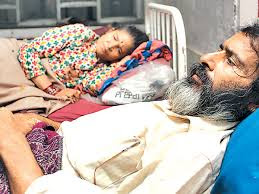In the context of Nepal, the hunger strike has been staged from time to time, the most recent being the 13th indefinite hunger strike staged by Dr. Govinda KC and the most unfortunate being hunger strike staged by Nanda Prasad Adhikari. Nanda Prasad Adhikari lost his life after an 11-month hunger strike, demanding that the Nepal government arrest the murderers of his son. There are other instances of hunger strike in Nepal, the hunger strike by Ganga Maya Adhikari, spouse of late Nanda Prasad Adhikari and hunger strike staged by various groups time to time to pressurize the government amongst others.
Hunger Strike also known as fast unto death protest has a long standing history as a form of protest that relies on the moral force and the strength of publicity value where by protestor fast as an act of protest to attain desired changes. From the pioneer of civil disobedience Mahatma Gandhi to the Tiananmen students in China, there are various examples from around the world on hunger strike being staged as a form of protest to attain various ends.
Legal Questions
Despite the global practice of hunger strike, there are legal questions which are still unsettled for instance the issues governing the legality of hunger strike, the issues of forced feeding and medical treatment once the health of the protestors deteriorates, and the obligation of the State under international and domestic laws.
A hunger strike is accepted as a form of protest protected under the right to peaceful protest, which is one of the fundamental human rights. Despite there is no such thing as “right to die” under international law, hunger strike is still not considered as against the law. However, some countries have enacted legislation allowing the force-feeding of detainees and prisoners on hunger strikes. For example, Israel passed a law on force-feeding of detainees on July 30, 2015. Some government also arrest those involved in the hunger strike on several grounds to hinder the staged protest.
In the case of Nepal, the staging of a hunger strike is not prohibited by law. However, much discussion on the issues associated with hunger strike is missing.
Forced Feeding and Medical Treatment during hunger strike
Forced feeding is mostly witnessed in the case of hunger strikes carried out by prisoners or detainees. Generally an act of force feeding someone on hunger strike may amount to an act of torture or cruel, degrading and inhuman treatment and a violation of international legal instruments.
In the case of Nevmerzhitsky v. Ukraine, the European Court of Human Rights (ECHR) has decided that force-feeding constituted an act of torture. Similarly, World Medical Association Declaration of Malta on Hunger Strikers states that those on hunger strike should not be forcibly given treatment they refused and should not be forced feed. However, artificial feeding with the hunger striker’s explicit or implied consent is ethically acceptable.
In contrary, ECHR has stated that if forced feeding is carried out as a medical necessity upon complying with the procedural guarantees for the decision to force-feed and the feeding is not conducted in a manner that is degrading or inhuman forced feeding would not be regarded as inhuman and degrading. Thus, not all forced-feeding of hunger strikers would amount to unlawful act under international law.
Government Obligation
A right to life is one of the fundamental human rights and States are under obligation to protect the rights. The question of the right to life of those staging hunger strike raises a thorny question. How would government protect the right to life of those prepared to die?
Those who stage hunger strike primary aim at particular reform or fulfillment of particular demands. They value their cause over their life and are willing to die for it. Only people with deep commitment and moral fiber can undertake such extreme steps to ensure broader change or reform. In global practice, the hunger strike is mostly used by those in prison as they do not have the prospect for another form of protest.
When someone stages a hunger strike, the government has limited options government must decide whether to comply with the protester's demands and come to an understanding, to force-feed him if necessary or allow him/her to die. Globally, there have been several cases where the protestors have died while staging a hunger strike. This tragic possibility should haunt Nepal Government due to the recent case of Nanda Prasad Adhikari. The government's good faith and commitment towards the legitimate demands of the protestor could save a life which is its legal obligation as well. Further, the demands can also be a catalyst for policy change.
The Government should understand the gravity of hunger strike when staged and must adhere to its obligation under domestic and international law to protect the life of the person. However, while protecting the right to life government cannot undermine the consent of the protestor and need to respect other rights including the right to peaceful protest and must not be subjected to inhuman and degrading treatment. The government must deal with the situation appropriately as hunger strike invokes not only the moral issue and public opinion but also substantive legal concerns.
Moral Battle in Immoral Times
I have huge respect for those who show courage to fight against what they believe is wrong putting their own life at risk. I am not sure how this moral battles will show color in the immoral times. I am skeptic about the government and worried for Dr. KC's well being. I personally request him not to put his life at risk with the expectation from the government to do the right thing. You should find other ways to carry on the fight; they will not listen; they don't have same moral fiber that you have.
Dr. Govinda KC for whom others wellbeing is always a priority over own.

